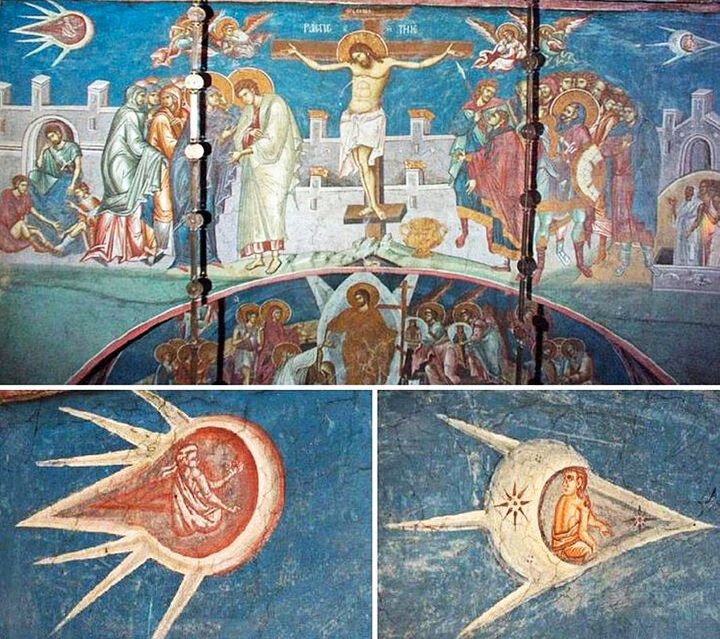This painting is by flemish artist Aert De Gelder and is entitled "The Baptism of Christ" It was painted in 1710 and hangs in the Fitzwilliam Museum, Cambridge. A disk shaped object is shining beams of light down on John the Baptist and Jesus.
As an artist I have always been fascinated by the power of art to act as a record for human consciousness. From the first cave paintings of human handprints, to the rich history presented and preserved in Egyptian hieroglyphs. Art is a powerful vehicle for transmitting and preserving complex ideas and world-views. Art can be profoundly symbolic, and is often used to hide controversial ideas within plain sight. Masonic symbols, for example, can only be understood by those who have been schooled in their meaning. The rest of us see what we want to see... or even as we are. What we can see is a reflection of not only what we know, but also what we are capable of grasping.
There are anomalous paintings, descriptions, and depictions of advanced Unidentified Flying Objects well before the technological era of modern humanity. There are "hints" that advanced craft have been in our skies, and their occupants have been communicating with human culture since the beginning of recorded history. The subject of visitation requires serious scientific investigation. But it also requires a paradigm shift. Sometimes art is less abrasive when exposing shockingly new ideas. Ideas that gnaw at our sense of pride and ego. We allow art to represent our subconscious, and tend to be less threatened by truths exposed within the mysterious realm of art. Maybe art can act as the messenger, and allow revolutions of mind to be born.
Weaponize your curiosity,
Jeremy
—
Jeremy Kenyon Lockyer Corbell
Creator, Extraordinary Beliefs
This painting is called "The Madonna with Saint Giovannino". It was painted in the 15th century by Domenico Ghirlandaio (1449-1494) and hangs as part of the Loeser collection in the Palazzo Vecchio. Above Mary's (left) shoulder is a disk shaped object. Below is a blow up of this section and a man and his dog can clearly be seen looking up at the object.
This painting is by Carlo Crivelli (1430-1495) and is called "The Annunciation with Saint Emidius" and hangs in the National Gallery, London. A disk shaped object is shining a beam of light down onto the crown of Mary's head.
Closeup image of the painting by Carlo Crivelli (1430-1495) called "The Annunciation with Saint Emidius".
Metohia, Yugoslavia - Visoki Decani Monastery - fresco above the sarcophagus of King Stefan titled “Crucifixion”. Painted in 1350.
In 2009, Corbell discovered this image of a lithograph in the Library Of Congress archives. It was created in 1866 depicting George Washington as a Mason. Corbell was struck not by the Masonic symbols, but rather by the curious disc shaped object in the left inner-arch that seems to be shown with a Jacob’s Ladder.
Here is a high-contrast enlargement to make the object’s shape and intension of the artist more distinct.







